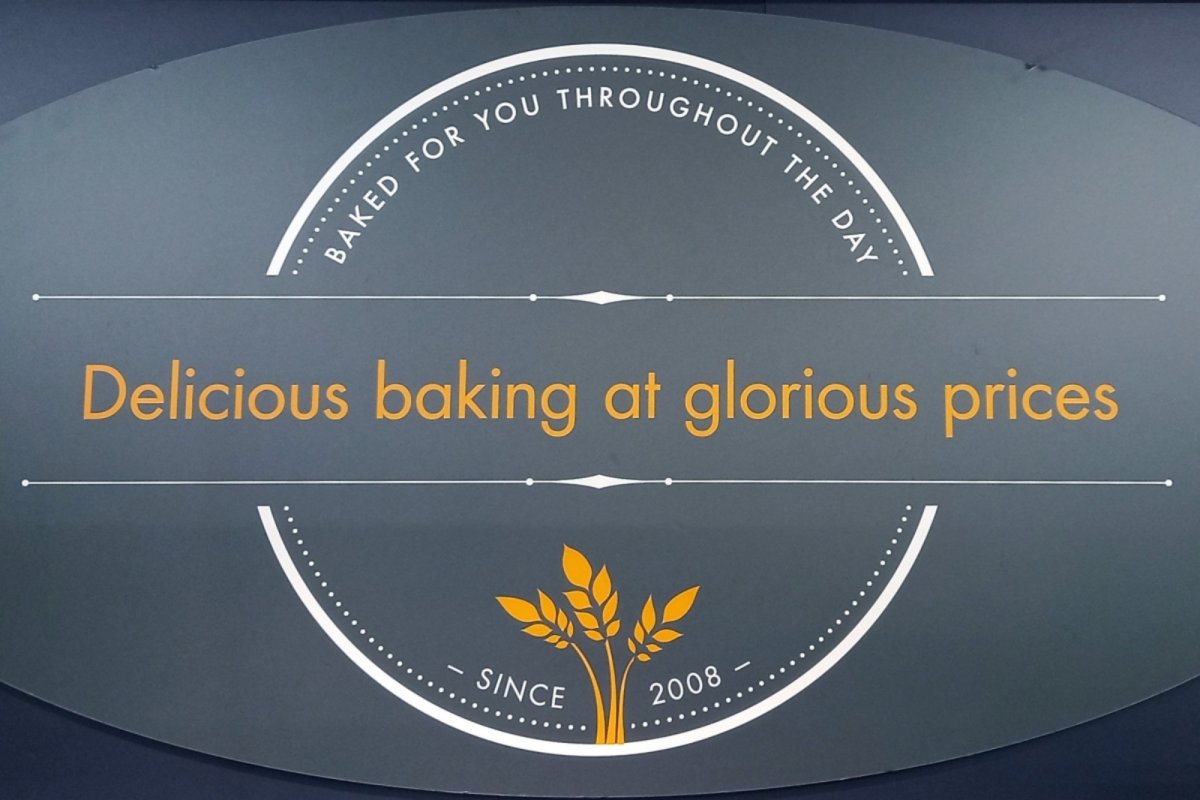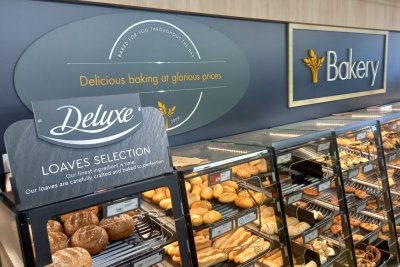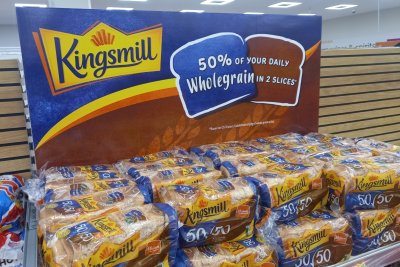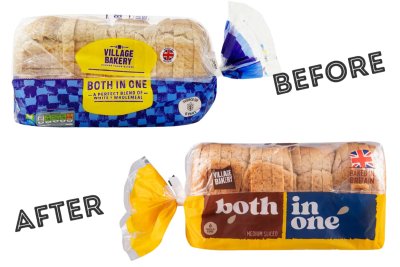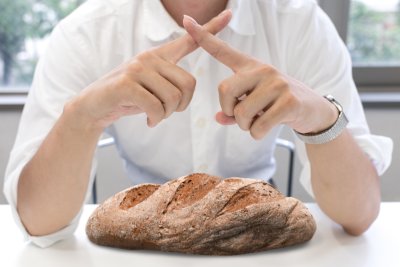 Re-baked.... Credit: Chris Young / www.realbreadcampaign.org CC-BY-SA-4.0
Re-baked.... Credit: Chris Young / www.realbreadcampaign.org CC-BY-SA-4.0
Lidl's half-baked loaf marketing?
The Real Bread Campaign's trading standards complaint.
On 20 September 2023, the Real Bread Campaign sent a complaint about Lidl's marketing of its in-store 'bakeries' to London Borough of Bexley, which is the company's Primary Authority for trading standards. The Campaign followed up in December 2023, January 2024 and April 2024.
On 25 April 2024, Bexley replied: 'We as Lidl’s PA have had no enquiries or complaints about the freshness claims made by the instore bakery. We are also happy, as Lidl’s PA that the claims are factual, and the bread is fresh when baked. We have had no enquires or complaints that Lidl’s bread becomes stale quicker that other bread.'
Below is the response sent by the Campaign to LB Bexley on 29 April 2024.
To be clear, this complaint is not that Lidl is making cheap products widely available, it is about how the company is marketing them.
The Campaign's email to Bexley
You have received a complaint about this – from me on 20 September 2023. You replied that I would have to ask LBTH to act as go-between, which I did, with LBTH advising me on 18 December 2023 that my complaint had been passed to Bexley. I followed this up with LBTH, CCing you, on 29 January 2024.
All of this, and full details of the case history, are in the email thread below my signature, but to summarise:
- The Lidl website refers to ‘our fresh in store bakery’ and ‘our freshly baked bread favourites’.
- In-store displays include claims such as ‘baked for you throughout the day’, as do small-bakery-style paper bags made available to shoppers.
- The truth is that Lidl does not bake anything fresh from scratch at any of its sites. The ‘bread’ products displayed in its ‘bakery’ section are not ‘freshly baked’ – they are made and baked elsewhere, and then baked again in-store.
We believe that Lidl’s use of such claims breach consumer protection regulations in general food law.
Freshly faked?
Lidl uses claims including ‘our fresh in store bakery’, ‘our freshly baked bread favourites’ and ‘baked for you throughout the day’ despite not baking any bread fresh from scratch at any of its UK stores. Instead, pre-made products are simply loaded into ovens to be baked for a second time for a browner, crisper crust.
FSA guidance states: ‘Terms such as “freshly baked”, “baked in store” and “oven fresh” may mislead consumers into believing that they are being offered products that have been freshly produced on site from basic raw materials. Some stores sell bread made from part-baked products that have been packed in an inert atmosphere or frozen off-site then “baked off” at in-store bakeries. Use of terms like “freshly baked”, “baked in store” and “oven fresh” on these products could potentially infringe the general legal provisions…’
These provisions include Regulation (EC) No 178/2002, which states that ‘it is a general principle of food law to provide a basis for consumers to make informed choices in relation to food they consume and to prevent any practices that may mislead the consumer.’
More specifically, Regulation (EU) No 1169/2011 requires that ‘food information shall not be misleading, particularly: (a) as to the characteristics of the food and, in particular, as to its nature, identity, properties, composition, quantity, durability, country of origin or place of provenance, method of manufacture or production.’
Article 16 of Regulation (EC) No 178/2002 requires that: ‘the labelling, advertising and presentation of food or feed, including their shape, appearance or packaging, the packaging materials used, the manner in which they are arranged and the setting in which they are displayed, and the information which is made available about them through whatever medium, shall not mislead consumers.’
Giving facts the cold shoulder
Regulation (EC) No 178/2002 requires that: ‘The name of the food shall include or be accompanied by particulars as to the physical condition of the food or the specific treatment which it has undergone (for example, powdered, refrozen, freeze-dried, quick-frozen, concentrated, smoked) in all cases where omission of such information could mislead the purchaser.’
We believe that selling a product that was baked, frozen or chilled and then re-baked, without providing point of sale information that this has taken place, breaches this regulation. We further believe that this is compounded when the product is marketed using claims such as those mentioned above, for the customer to pop it into a brown paper bag like they might in a small, local bakery.
Re-baking has a negative impact on the quality of the food in that it is likely to stale more quickly than genuinely fresh bread that has only been baked once. This increases the risk of food waste. Shoppers also have the right to know if a product has been re-baked as the process uses around twice as much energy as baking a product once and so may have a negative environmental impact.
We believe this also breaches section 6 on misleading omissions of The Consumer Protection from Unfair Trading Regulations 2008 in that ‘the commercial practice omits material information.’
A long time ago in a bakery far, far away?
We understand that some Lidl ‘bakery’ section products are made outside the UK and so believe that claims such as those outlined above are at odds with country of origin labelling requirements.
Regulation (EU) No 1169/2011 requires that: ‘The indication of the country of origin or of the place of provenance of a food should be provided whenever its absence is likely to mislead consumers as to the true country of origin or place of provenance of that product.’
The regulation goes on to state that this should: ‘be provided in a manner which does not deceive the consumer and on the basis of clearly defined criteria which ensure a level playing field for industry and improve consumers’ understanding of the information related to the country of origin or place of provenance of a food.’
Unfair comparison?
Factors including economy of scale mean that, by choosing centralised mass production (and the ability to profit from thousands of high margin, non-bakery items) it is hardly surprising that Lidl can offer ‘bread’ products at prices much lower than small bakeries have to charge. We believe that Lidl using the previously mentioned claims and visual cues is unfair practice that is likely to influence the average consumer’s buying decisions.
The truth is important as re-baking in what we call loaf tanning salons:
- doesn’t support skilled bakery jobs in the store’s local community.
- uses around twice as much energy as a product that is baked once.
- results in products that tend to stale more quickly and so are more likely to be discarded, to the detriment of the shopper and the environment.
To be clear, we are not suggesting that Lidl should stop using additives or start employing bakers to make genuinely fresh bread from scratch in its stores - though we very much advocate both.
What we are urging you to do is to protect people by stopping the company from profiting by using marketing that is likely to lead shoppers to believe they are getting something that they are not. We also ask you to direct the company to display information about when, where and how its ‘bakery’ section products are made, in clear, unambiguous language.
As it is now seven months since I first submitted our complaint, please expedite investigating these issues and advising what action you will be taking.
Spotted misleading loaf tanning salon marketing?
Have you seen 'freshly baked', 'baked in store' or similar claims by a different supermarket chain in an outlet where you know nobody is making bread fresh from basic ingredients? Please email us photos and details. Find out more.
See also
Updates
(LB Bexley = London Borough of Bexley Council, which has the Primary Authority relationship with Lidl for trading standards. LBTH = London Borough of Tower Hamlets, the local authority for where the Sustain office is located.)
3 March 2025: We asked Bexley and LBTH for answers to our questions of 5 and 18 November 2025.
10 February 2025: Bexley said they will: 'ask Lidl to amend their announcement'. They made no reference to the still outstanting pints of our complaint.
5 February 2025: We advised Bexley that, desite their assurance on 1 November 2024, we had heard a recorded announcement in a Lidl store that included the claim that bread is ‘freshly baked’. We also asked for a respnse to our email of 18 November 2024.
18 November 2024: We followed up the question we asked LB Bexley on 5 November.
We also included a photo we received, taken in a Lidl store last week. Our understanding is that it depicts ‘thaw and serve’ products, which are manufactured outside the UK, frozen, shipped to stores and simply defrosted before being put on the shelf. We asked, if this is indeed the case, does the trading standards officer agree with our belief that Lidl marketing them as ‘baked throughout the day’ (as per the signage in this store’s ‘bakery’ section display) is misleading.
5 November 2024: Lidl deletes freshly baked bread claim. We replied to LB Bexley for advising us of this. We noted, however, that Lidl is still marketing re-baked products as ‘baked for you throughout the day’, for example on signage and ‘bakery’ section bags. We asked: 'What is your timescale for the company removing this claim?'
25 October 2024: We asked LB Bexley for an update on the progress they have made on this case in the past seven and half weeks.
2 September 2024: We replied to LB Bexley: 'To summarise the key point we are making: baked/baking, which is what Lidl claims it does in store (supported by the visual cues that we outlined), is not the same as RE-baked/RE-baking, which is what Lidl does in store.
As an analogy, let’s say pies are manufactured at an industrial unit, chilled or frozen, transported to a retail outlet, and then re-heated at a later date in store shortly before sale. Marketing the pies using claims such as ‘cooked for you throughout the day’, ‘our freshly cooked pie favourites’ or ‘‘our fresh in store pie shop’ would be misleading.
The fact that something is misleading is not contingent on people complaining about being misled, or even knowing that they are. Even if it was, ours being the only complaint that you have yet received on this issue does not prove that people aren’t being misled.
Other possible reasons that you have not received more complaints include that people:
- are unaware that there might be anything to complain about because they believe Lidl’s marketing, so don’t know that products are re-baked - rather than baked – in store.
- feel they are being misled but know that the Real Bread Campaign is working on the case and so are leaving us to it.
- tried to complain to the trading standards department of their local authority but gave up because that LA does not publish the department’s contact details.
- managed to obtain contact details for the trading standards department of their local authority and submitted a complaint but were referred on to Citizens Advice and gave up.'
29 August 2024: LB Bexley responded: 'As previously mentioned, we are happy, as Lidl’s PA, that the claims are factual, and the bread is fresh when baked. There is also no evidence that people are being misled (we have received no enquiries of complaints from any customers of colleagues relating to the customer being misled).'
28 August 2024: We re-sent our 22 August email to LBTH, and received the reply: 'When we refer a matter over to another Local Authority, it is their responsibility to keep you updated on their investigation. Please liaise directly them to query why you have not been updated.' We therefore emailed LB Bexley.
22 August 2024: We again asked LBTH for confirmation that they had passed our complaint on to LB Bexley, as we asked on 30 May, and to ask LB Bexley for an update on their investigation and an ETA of a fully reply.
17 June 2024: We asked LBTH for confirmation that they had passed our complaint on to LB Bexley, as we asked on 30 May. LBTH responded: "London Borough of Bexley have confirmed that the matter needs to be dealt with by Hertfordshire CC." We replied by asking if they had confused the Lidl case with the similar Tesco case.
30 May 2024: LB Bexley responded: 'As previously mentioned, you will have to speak to Tower Hamlets as they are your Local Authority.'
We replied: 'LBTH passed our complaint about Lidl to you in September 2023. My email of 29 April 2024 is supplying further information to help you investigate our complaint.
As the ball is already rolling (and has been for almost 9 months), I don’t understand why you want to create unnecessary extra work for your colleagues at LBTH by pulling them back into the loop. I have, however, asked LBTH to play go-between once again.'
29 May 2024: A month on from our most recent email to LB Bexley (which has the Primary Authority relationship with Lidl for trading standards) we emailed again to ask for a progress report and when we can expect a fuller response on our complaint.
Real Bread Campaign: Finding and sharing ways to make bread better for us, our communities and planet.
Sustain
The Green House
244-254 Cambridge Heath Road
London E2 9DA
020 3559 6777
sustain@sustainweb.org
Sustain advocates food and agriculture policies and practices that enhance the health and welfare of people and animals, improve the working and living environment, promote equity and enrich society and culture.
© Sustain 2025
Registered charity (no. 1018643)
Data privacy & cookies
Icons by Icons8
